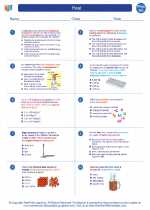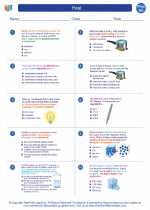Geology
Geology is the scientific study of the Earth, including its composition, structure, and processes. It encompasses the study of rocks, minerals, mountains, volcanoes, earthquakes, and the history of the Earth’s formation and development. Geologists use various methods and tools to investigate the Earth’s physical and chemical properties, and to understand its past, present, and future.
Key Concepts in Geology
- Plate Tectonics: The theory that the Earth's outer shell is divided into several plates that glide over the mantle, causing earthquakes, volcanic activity, and the formation of mountains.
- Rock Types: Geologists classify rocks into three main types - igneous, sedimentary, and metamorphic - based on their formation processes.
- Earthquakes and Volcanoes: The study of seismic activity and volcanic eruptions, including their causes, effects, and prediction methods.
- Geological Time Scale: The timeline of Earth’s history, divided into eons, eras, periods, and epochs, based on significant geological events and changes.
- Mineralogy: The study of minerals, their properties, occurrences, and uses in various industries.
Study Tips for Geology
Studying geology can be fascinating and challenging. Here are some tips to help you succeed in your geology studies:
- Understand the Basics: Start by understanding the fundamental concepts of geology, such as the rock cycle, plate tectonics, and geological time scales.
- Visualize and Explore: Use maps, diagrams, and geological samples to visualize different geological features and formations. Field trips and virtual simulations can also enhance your understanding.
- Practice Classification: Familiarize yourself with the classification of rocks and minerals, and learn to identify them based on their physical and chemical characteristics.
- Stay Updated: Keep abreast of current geological events, discoveries, and research findings through scientific journals and reputable websites.
- Seek Help When Needed: If you encounter challenging topics or concepts, don't hesitate to seek help from your instructor, classmates, or online resources.
With these study tips and a solid understanding of key geological concepts, you'll be well-equipped to excel in your geology studies and appreciate the fascinating science of the Earth's history and processes.
.◂Physics Worksheets and Study Guides High School. Heat
The resources above cover the following skills:
PHYSICAL SCIENCE (NGSS)
Energy
Students who demonstrate understanding can:
Create a computational model to calculate the change in the energy of one component in a system when the change in energy of the other component(s) and energy flows in and out of the system are known.
Develop and use models to illustrate that energy at the macroscopic scale can be accounted for as either motions of particles or energy stored in fields.



